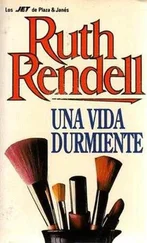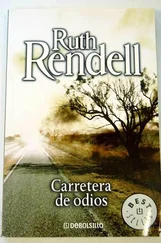Turning away from the desk and the door of Room 2, his eye fell on the hall table. Something seemed to clutch at his chest, squeezing his ribs. All the letters were still there, undisturbed; the bill for Brian Kotowsky, the official-looking correspondence for Winston Mervyn, the mauve-grey envelope from Bristol for Anthony Johnson. No one had returned to the house since that morning, no one had removed a letter. Arthur put his hand over the Bristol envelope, covering it. A light, constant tremor animated his hand, a tremor that had been there, electrifying his hands and his body with a delicate, frenetic throb from the moment he had witnessed that fire and its consequences. Blood beat in his head as if it were feeding an engine.
He thought now of the telephone call he had overheard. “Your next letter’s our last chance.…” Her next letter. It lay under his trembling hand. Arthur lifted it up, holding it by its edge as if its centre were red-hot. Words of Auntie Gracie’s trickled across his brain.
“Other people’s correspondence is sacrosanct, Arthur. To open someone else’s letter is the action of a thief.”
But she was gone from him, never more to guard him, never more to watch and save.… He ripped open the envelope, splitting it so savagely that it tore into two pieces. He pulled the letter out. It was typewritten, not on mauve-grey paper but on flimsy such as is used for duplicates, and the machine was an Adler Standard like the one in his office at Grainger’s.
Darling Tony, I think I’ve changed a lot since I spoke to you. Perhaps I’ve grown up. Suddenly I realised when you put the phone down that you were right, I can’t hover and play this insane double game any more. It came quite clearly to me that I have to choose directly between you and Roger. I would have called you back then and there, but I don’t know your number—isn’t that absurd? I only know your landlord’s got a name like a river or a sea .
I have chosen, Tony. I’ve chosen you, absolutely and finally . For ever? I hope so. But I promised for ever once before, so I’m chary of making that vast dreadful promise again. But I will leave Roger and I will marry you if you still want me .
Don’t be angry, I haven’t told Roger yet. I’m afraid, of course I am, but it isn’t only that. I can’t tell him I’m leaving him without having anywhere to go or anyone to go to. All you have to do for me to tell him is to write—write to me at work—and let me know where and when to meet you. If my letter gets to you by Tuesday, you should be able to get yours to me by Friday at the latest. Of course, what I really mean is I want word from you that you aren’t too disgusted with me to need me any more. I will do whatever you say. Command me .
Tony, forgive me. I have played fast and loose with you like “a right gypsy.” But no longer. We could be together by Saturday. Say we will be and I will come even if I have to run from Roger in my nightdress. I will be another Mary Stuart and follow you to the ends of the earth in my shift. I love you. H .
Arthur felt a surge of power. Just as the control of his destiny, his peace, had lain in Anthony Johnson’s hands, so the other man’s now lay in his. An eye for an eye, a tooth for a tooth. Anthony Johnson had taken away his white lady; now he would take from Anthony Johnson his woman, rob him as he had been robbed of his last chance.
He screwed up the letter and envelope and thrust them into his pocket. He walked down the hall and came to the foot of the stairs. How terrible and beautiful the silence was! With something like anguish, he thought of the cellar, unguarded, unwatched. Wasn’t it possible he could still get some relief from it, from its atmosphere that had fed his fantasy, from an imagination that could still perhaps provide, furnishing her absence with vision and empty air with flesh? He turned off the light, left the house and made his way down the side passage. But he had no torch, only a box of matches in his pocket. One of these he lit as he passed through the first and second rooms. He lit another and in its flare saw the heap of clothes on the floor, Auntie Gracie’s dress, the bag, the shoes, and scattered all of them like so much trash as if they had never clothed a passion.
It was the death of a fantasy. His imagination shrivelled, and he was just an embittered man in a dirty cellar looking at a pile of old clothes. The match burned down in his fingers; its flame caught the box which suddenly flared into a small brilliant fire. Arthur dropped it, stamped on it. He caught his breath on a sob in the darkness, stumbled back through the thick darkness, feeling his way to the steps.
Through the passage to the front he walked. He turned to the right, crossed the grass, set his foot on the bottom step. Like others before him, he would have been safe if he had not paused and looked back. The mouth of the dark opened and called him. The jaws of darkness received him, the streets received him, taking him into their arteries like a grain of poison.
The tables were bare, the fire had burned out, and the only fireworks which remained were those sparklers which are safe for children to hold in their hands. Only they and the stars now glittered over the frosty, debris-scattered ground. Linthea had stacked her crockery into the barrow and now, having collected her son and Steve, left them with a wave and one of her radiant smiles.
Anthony and Winston Mervyn began dismantling the trestle tables which they would return to All Souls’ hall. The last of the fire, a fading glow, dying into handfuls of dust, held enough heat to warm them as they worked. Winston, who seemed preoccupied, said something in a language Anthony recognised for what it was, though the words were unintelligible.
“What did you say?”
Winston laughed and translated. “Look at the stars, my star. Would I were the heavens that I might look at you with many eyes.”
“Amazing bloke, you are. I suppose you’ll turn out to be a professor of Greek.”
“I thought of doing that,” Winston said seriously, “but there’s more money in figures than in Aristotle. I’m an accountant.” Anthony raised his eyebrows but he didn’t say what he wanted to, why was an accountant living at that grotty hole in Trinity Road? “Easy does it,” said Winston. “You take that end and I’ll go ahead.”
They carried the tables up Magdalen Hill and along Balliol Street. A Roman candle, ignited outside the Waterlily, illuminated in a green flash the cavelike interior of Oriel Mews. Anthony, walking behind Winston, realised that although he had been told what Winston had quoted, he hadn’t been told why he chose to quote it. All Souls’ caretaker took the tables from them, and Winston suggested a drink in the Waterlily. Anthony said all right but he’d like to go home first as he was expecting an important letter.
A hundred and forty-two was a blank, dark smudge in a street of lighted houses. Winston went in first. He picked up his letters from the table. There was nothing for Anthony. Well, Helen’s letter didn’t always come on a Tuesday. It would come tomorrow.
“That’s more like it,” said Winston. “I might get along and look at that tomorrow.” He passed a printed sheet to Anthony, who saw it was an estate agent’s specification of a house in North Kenbourne, the best part. The price was twenty thousand pounds.
“You’re a mystery,” he said.
“No, I’m not. Because I’m coloured you expect me to be uneducated, and because I live here you expect me to be poor.”
Anthony opened his mouth to say this was neither true nor fair, but he knew it was, so he said, “I reckon I do. Sorry.”
“I came to live here because my firm moved to London and now I’m looking for a house to buy.”
Читать дальше











